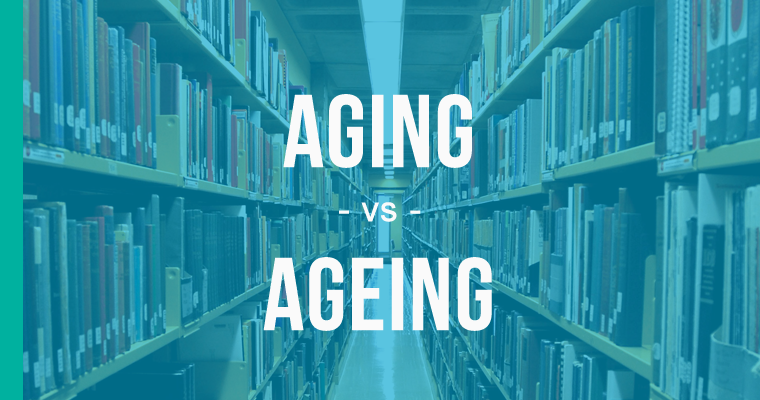Ageing or Aging – What’s the Difference?

What’s the Difference Between Aging and Ageing?
These two words are alternate spellings with the same meaning. Which one you use depends on whether or not you are writing in or for North America.
Aging is the gerund form, and the progressive form, of the verb to age, meaning to become older. This is the preferred spelling in North American English, meaning American English and Canadian English.
- Many people are afraid of aging, but it is something that everyone must do.
Ageing has the exact same meaning and grammatical rules as aging. This is the preferred spelling outside of North America, in British English.
- One of the effects of ageing is wrinkled skin.
Now, let’s go over a few ways you can use these words in your sentences.
Using Aging in a Sentence
When to use aging: Aging is a gerund that means growing older. It is the gerund form of the verb to age, meaning the noun form of the action. Use this spelling if you are writing in North America, or for North American audiences. It can also act as the progressive form of the verb to age, or as an adjective.
For example:
- Aging has some benefits, such as getting senior discounts. (gerund)
- Although he seemed younger than his age for most of his life, he now appears to be aging rapidly. (progressive form of the verb)
- An aging population means higher health care costs. (adjective)
Aging can refer to someone at any age growing older. However, it usually has the connotation of someone elderly or becoming elderly.
Using Ageing in a Sentence
When to use ageing: Ageing is no different than the word aging, except for its spelling and the countries which prefer this spelling. It is the correct spelling for British English, which also includes places such as Australia and South Africa.
For example:
- Some of the effects of ageing are difficult to observe at first, such as dementia and Alzheimer’s. (gerund)
- The ageing widow still walks a mile each day for exercise. She says it keeps her healthy. (adjective)
- Many actresses look like they aren’t ageing at all. (progressive form of the verb)
Despite ageing being the standard spelling in British English, aging is almost equally common in British English. That being said, you should still spell the word as ageing when using British English.
Remembering Aging vs. Ageing
Both of these words are correct, and they have the same meaning. Nevertheless, it is still important to choose the standard spelling for your dialect. You can use the spelling of aging and ageing to help you remember which version is appropriate for each dialect.
The word ageing contains an e, just like the country name England. This can help you remember that British English, the kind used in England, spells the word as ageing.
Outside Examples
- Plans to replace aging computers and develop a technology replacement plan are underway in the Glendale Unified School District. –LA Times
- New technology, known as “aging-in-place” technology, is enabling seniors to extend and improve independent living. Writer Sally Abrahms explained that new applications could help loved ones track a senior’s daily activities and will send an alert of anything out of the ordinary. –OC Register
- Injectables that fall into the category of chemodenervation relax the muscles in the face that cause wrinkles like Botox, Dysport and Xeomin. Fillers, like Juvederm, Perlane, Restylane, Voluma, will do just that – fill in the wrinkles and crevices that happen as a result of ageing. –Houston Chronicle
- Nearly half (46%) of the Australians participating in the study expressed “mild” anxiety about talking to a financial adviser anxiety and one in four expressed “moderate” to “severe” anxiety, according to the study from the National Seniors Productive Ageing Centre, a research group based Melbourne, Australia. –USA Today
Quiz: Ageing vs. Aging
Instructions: Fill in the blank with the correct word or expression, either ageing or aging, in the correct form.
- Eating a healthy diet and exercising regularly can help mitigate many of the negative effects of ___________. (American English)
- I actually look forward to ________________ because I can’t wait to retire and spend all my time golfing and playing bingo. (British English)
- My _____________ grandmother is starting to forget things more frequently. (when writing for a Canadian audience)
- My ____________ great-grandfather is still sharp of wit! (when writing for an Australian audience)
See answers below.
Article Summary
Should I use aging or ageing? Both aging and ageing are correct spellings with the same meanings. However, there is an important distinction between the two.
- Aging is the only appropriate spelling for American English and Canadian English.
- Ageing is the standard spelling for British English, and all dialects of English outside of North America.
Be careful to know which spelling is appropriate when choosing which of these to use.
Answers from Quiz
- aging
- ageing
- aging
- ageing
